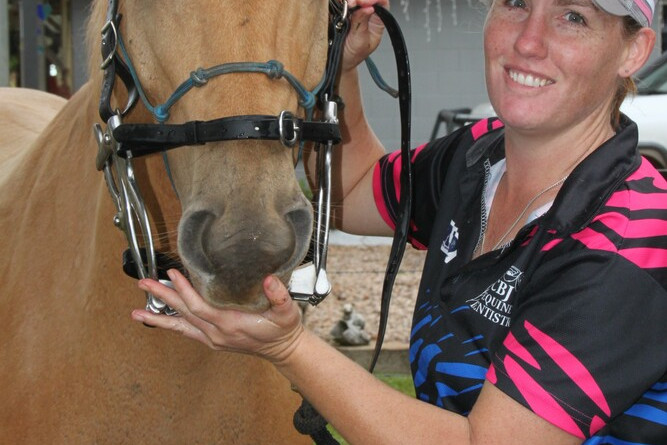On The Land
16 September, 2022
Equine dentist all about education
CHERIE Bramich's equine dentistry services are in big demand. Clients north to Cooktown, west to Croydon and all over the Tablelands, are discovering the benefits of including their horses in Cherie's progressive dental health program.

The former human dental assistant is one of just three equine dental practitioners operating north of Townsville, and is passionate about helping horses and their owners.
She believes there is a big need for education around horse health.
“We have a lot of knowledgeable horse therapists up here now and a lot of horse owners and the more we can share that knowledge around, the better,” Ms Bramich said.
“It's important to look at the whole horse – I always say no feet, no teeth, no horse!
“Many horse owners are spending a lot of money on good quality feed for their animals, but the best nutrition in the world won't help if their horses can't chew and digest their feed.”
Ms Bramich says because humans have taken horses out of their natural (wild), semi-arid environment, enclosed them in paddocks and fed them with softer, improved pastures and/or processed feeds (hay and grain) that don’t require much mastication, it reduces natural wear on their teeth.
Hooks and ramps can develop on their teeth, gouging into their gums and jawbones, causing severe pain. Long incisors can cause chewing problems and sharp points on the inner and outer edges of the cheek teeth can create painful lacerations and ulcers.
The Cert IV in Equine Dentistry graduate said dental issues were not always obvious to owners.
“Their horse may still be in good condition, but there are many signs to alert owners to existing or developing problems,” Ms Bramich said.
The most obvious sign of dental trouble is a change in chewing habits.
The horse may dribble or drop feed out of its mouth while eating, roll feed into balls rather than chewing and drop it on the ground (quidding) or wash their feed in their water container.
Some hold their head to the side when eating, refuse to eat hard grain or begin swallowing their food before chewing is complete which can lead to life threatening colic from impacted food.
Physical signs can include excess saliva, bad breath, swelling of the face and jaw, bleeding from the mouth, weight loss and the presence of whole grains in their manure.
These problems often translate into behavioural issues such as tossing their head or pulling to one side when being ridden, gaping or chomping the bit, increased resistance to the bridle, nervousness and even rearing or pig rooting with riders.
“Eventually I would love to run some educational day seminars for horse owners in conjunction with other horse health therapists,” Ms Bramich said.
“I have been lucky enough to train with experts like Ian Wharton, who set up the Tamworth course I attended under the International Association of Equine Dentistry.
“As a member of their association, I can access advice from practitioners in Switzerland, the United States and Germany.
“I can also go to Idaho and train to become certified as an International Equine Dentist and practice in multiple locations around the world, which I would love to do one day. The more knowledge you get the more you can share and knowledge costs nothing to carry with you and share with others.
“I grew up with horses at Herberton and have always loved them. I was into barrel racing and am keen to get involved in camp drafting and the obstacle-based Extreme Cowboy Racing.
“I worked as a custodial prison officer for years in Mareeba, Townsville and various locations down to the Gold Coast, doing sentence management, transfer and parole.
“I enjoyed the work and got to ‘see some stuff ’' but once I had my son Bryce, I wanted to move back home.
“It wasn't long after moving back that I got myself a horse again and it was when I had a local dental practitioner tending to him, I realised what a need there was for more qualified horse therapists in the area.
“Horsemanship skills, the ability to read horses and a calm and confident manner are very important in this job.
“I will treat 40 horses over a weekend on a run out to Croydon and my horses are hardly ever sedated or heavily restrained, unless they have a very serious issue.”
Ms Bramich said in an ideal situation, owners should introduce their youngsters to dental checks at around 12 months when they start losing their baby teeth.
“This not only gets them used to the process, but it stops mal-occlusions and other problems developing,” she said.
“My clients own a mix of competitive, work and leisure horses, but by working together as an industry and keeping it local, we can raise our level of horse health awareness, which will benefit everyone.”


